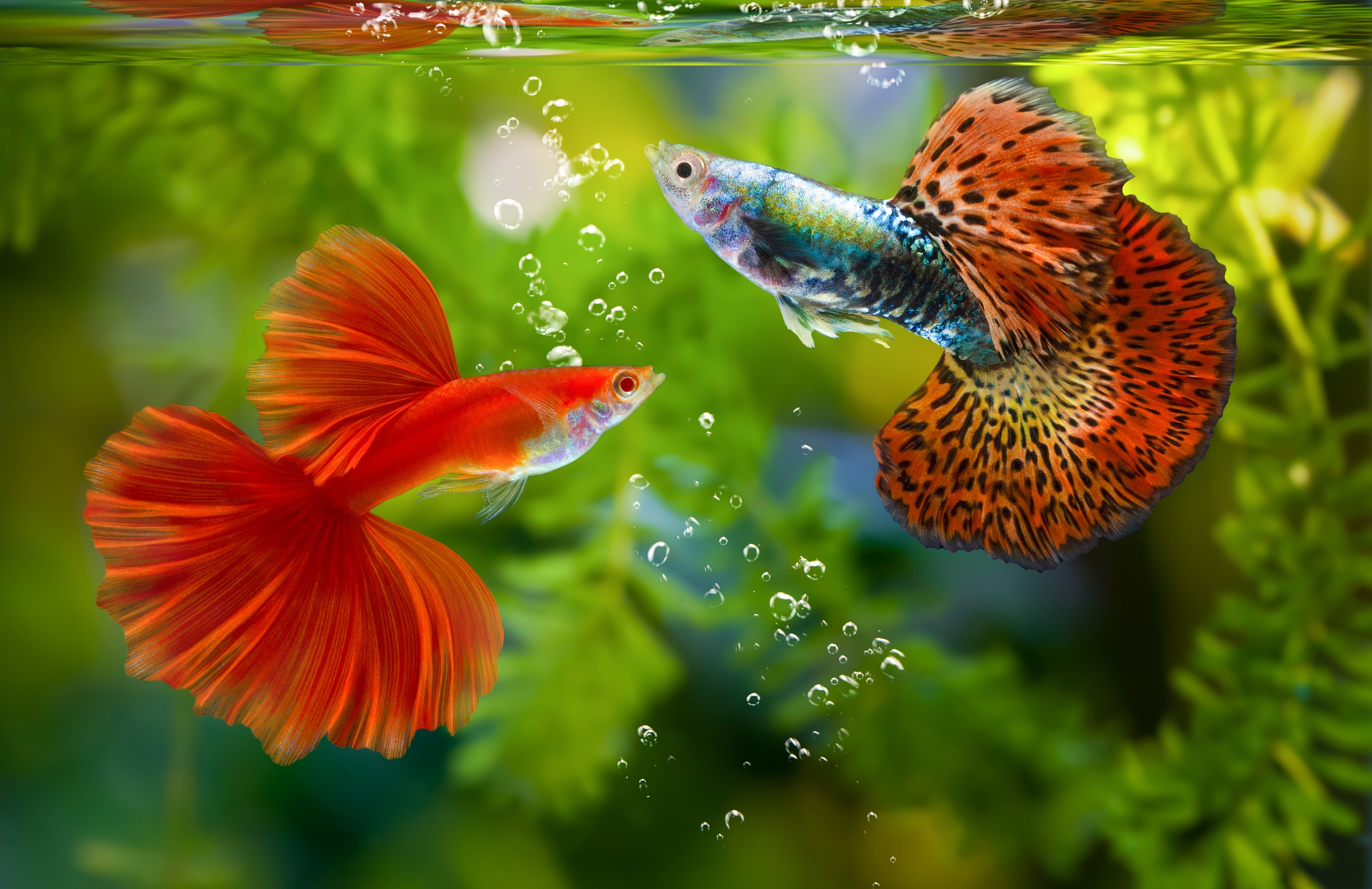Contents
- 1. Introduction to Guppy Feeder Fish
- 2. Types of Guppy Feeder Fish
- 3. Nutritional Benefits of Guppy Feeder Fish
- 4. Feeding Habits and Behavior of Guppy Feeder Fish
- 5. Role of Guppy Feeder Fish in Keeping the Aquarium Clean
- 6. Preventing Nutrient Buildup with Guppy Feeder Fish
- 7. Boosting Fish Health and Immunity
- 8. Guppy Feeder Fish as a Source of Entertainment
- 9. Choosing Guppy Feeder Fish for Different Aquatic Setups
- 10. Potential Risks and Precautions with Guppy Feeder Fish
Imagine a world where the beauty of your aquarium shatters as your fish float lifelessly at the top. A grim picture indeed, but one that highlights the crucial role of guppy feeder fish in maintaining the health and balance of your aquatic haven. These small, vibrant creatures not only add a captivating touch to your tank, but they also provide an essential source of nutrition for larger, more finicky species. So, let’s dive into the importance of guppy feeder fish and discover how they can ensure the vitality and longevity of your beloved aquarium.
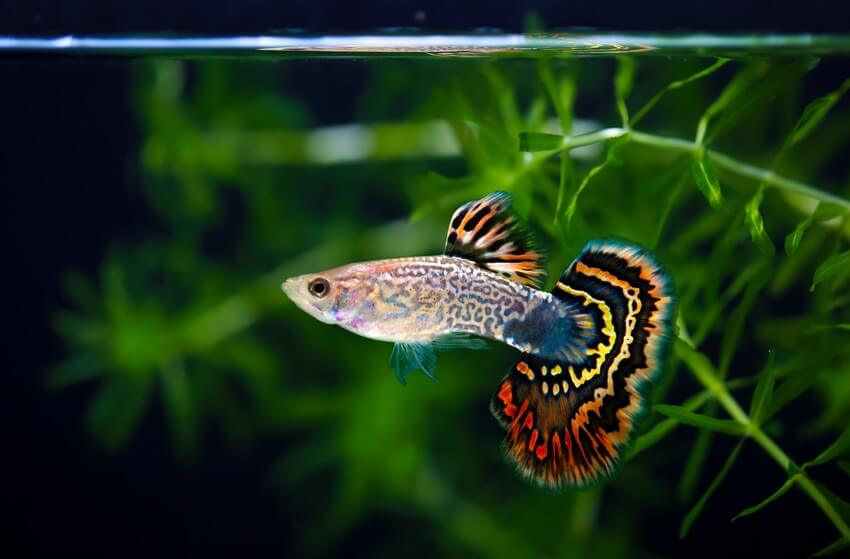
1. Introduction to Guppy Feeder Fish
Guppy feeder fish play a crucial role in maintaining the health and vibrancy of aquariums. These small fish are commonly used as a food source for larger predatory fish but provide much more than just a meal. They offer a range of nutritional benefits, contribute to the cleanliness of the aquarium, and can even enhance the overall well-being of the fish community. In this article, we will explore the different types of guppy feeder fish, their nutritional benefits, feeding habits, and other essential aspects of their role in aquarium ecosystems.
2. Types of Guppy Feeder Fish
2.1 Live Feeder Fish
Live feeder fish refer to small fish species that are raised specifically to be fed to larger fish. They are typically sold in pet stores and can include species like guppies, minnows, and goldfish. Live feeder fish provide the opportunity for fish to engage in natural hunting behaviors, promoting both physical and mental stimulation. Additionally, they offer high nutritional value, as they are consumed in their natural state.
2.2 Frozen Feeder Fish
Frozen feeder fish are a convenient alternative to live feeder fish. They are usually small fish species that have been frozen to preserve their nutritional value. These frozen fish can be easily stored in the freezer and thawed before feeding. While they may not provide the same level of mental stimulation as live feeder fish, they still offer the necessary nutrients for the predatory fish.
2.3 Pelleted Feeder Fish
Pelleted feeder fish are a processed form of guppy feeder fish. They come in the form of small, bite-sized pellets that are fortified with essential nutrients. This type of feeder fish provides a practical solution for fish owners who prefer a controlled and regulated feeding routine. Pelleted feeder fish can be easily portioned and have a longer shelf life compared to live or frozen options.
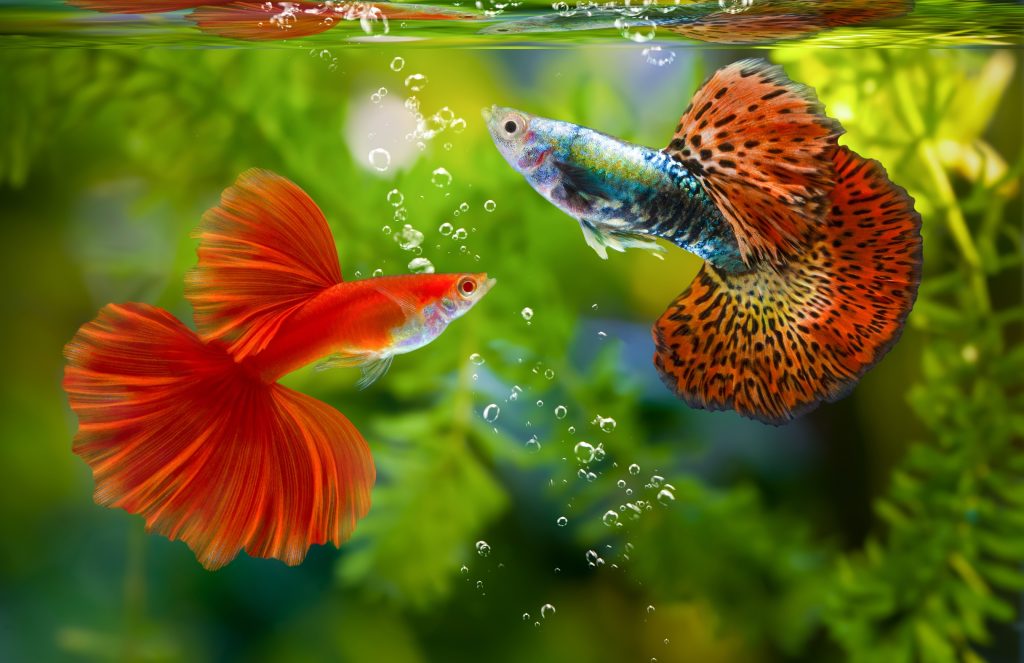
3. Nutritional Benefits of Guppy Feeder Fish
3.1 High Protein Content
Guppy feeder fish are rich in protein, making them an excellent source of this essential macronutrient for predatory fish. Protein is crucial for the growth, repair, and maintenance of body tissues. It supports healthy muscle development, boosts the immune system, and promotes overall fish well-being. Feeding your fish with guppy feeder fish ensures they receive an adequate protein intake for their optimal health.
3.2 Essential Fatty Acids
Feeder fish, especially those that are live or frozen, contain essential fatty acids such as omega-3 and omega-6. These fatty acids are vital for the normal physiological functioning of fish. They contribute to brain health, promote healthy skin and scales, and support reproductive processes. Including guppy feeder fish in your fish’s diet can help ensure they receive a sufficient amount of these important fatty acids.
3.3 Rich in Vitamins and Minerals
Guppy feeder fish are naturally rich in various vitamins and minerals, which are essential for the overall health of fish. They contain vitamins such as vitamin A, vitamin D, vitamin E, and vitamin B complex, which play critical roles in maintaining healthy vision, promoting bone health, and supporting metabolic processes. Additionally, these feeder fish provide minerals like calcium, phosphorus, and iron, which are necessary for proper growth and development.
4. Feeding Habits and Behavior of Guppy Feeder Fish
4.1 Encouraging Natural Hunting Behavior
One of the unique benefits of guppy feeder fish is their ability to stimulate the natural hunting behavior of predatory fish. By providing live or frozen feeder fish, fish owners can observe their fish engage in instinctual hunting techniques. This not only adds excitement and entertainment to the aquarium but also allows the fish to exercise their natural instincts.
4.2 Controlling Overfeeding
Feeding fish can sometimes be challenging, as they may not have a natural cue to stop eating. Overfeeding can lead to various health issues, including obesity, poor water quality, and increased waste production. Guppy feeder fish offer a solution to this problem. By allowing predatory fish to hunt their own food, they are less likely to overeat, as they will only consume what they can capture. This helps maintain a healthy balance in the aquarium.
4.3 Feeding Frequency
The feeding frequency for guppy feeder fish can vary depending on the size and dietary requirements of the predatory fish in your aquarium. It is generally recommended to feed fish small amounts multiple times a day, rather than one large feeding. This mimics their natural feeding patterns and ensures that all fish receive an adequate amount of food. Care should be taken not to overfeed, as excess food can lead to water pollution.
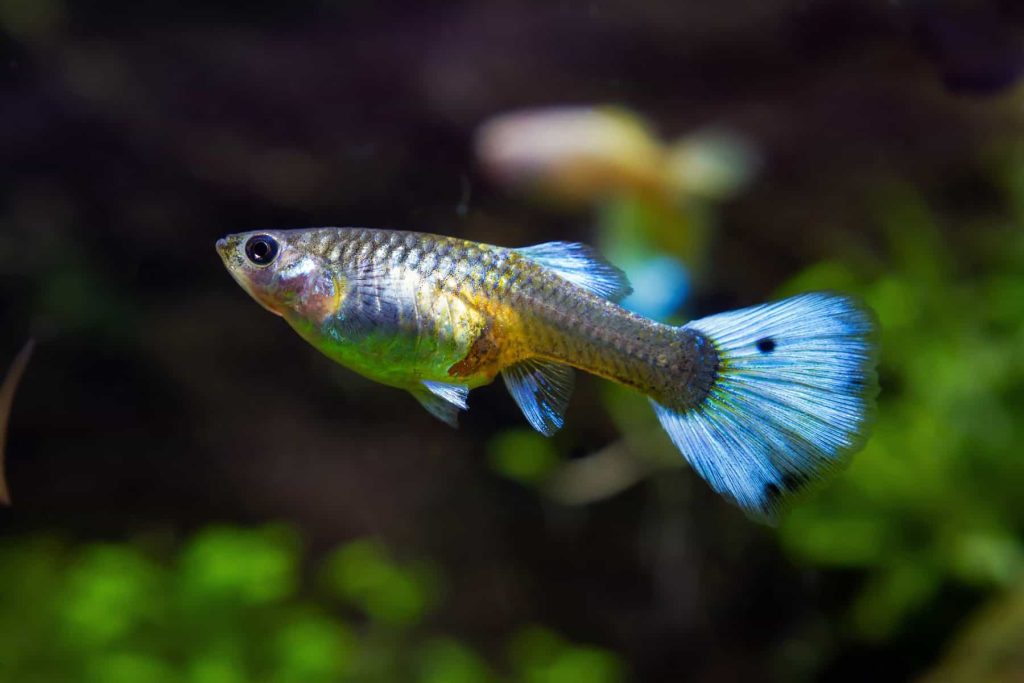
5. Role of Guppy Feeder Fish in Keeping the Aquarium Clean
5.1 Algae Control
Guppy feeder fish play a significant role in maintaining a healthy balance of algae in the aquarium. Some species of guppies and other feeder fish have a natural inclination to consume algae. By introducing these fish into your aquarium, you can effectively control and reduce the growth of algae. This helps prevent the water from becoming cloudy and promotes a cleaner and clearer aquatic environment.
5.2 Breakdown of Organic Waste
In addition to algae control, guppy feeder fish also contribute to the breakdown of organic waste in the aquarium. Fish produce waste in the form of uneaten food, feces, and decaying plant matter. Feeder fish, particularly bottom-dwelling species, are adept at scavenging and consuming these waste materials, preventing them from accumulating and causing water pollution. Their presence aids in maintaining a healthier ecosystem for all fish inhabitants.
5.3 Maintaining Water Quality
The cleanliness and quality of the aquarium water are essential for the overall health and well-being of fish. Guppy feeder fish indirectly contribute to water quality by controlling algae growth and reducing the accumulation of organic waste. By actively participating in the cleanup process, these fish help maintain the optimal conditions necessary for fish survival. Regular water testing and appropriate filtration systems should still be employed to ensure a well-balanced and healthy aquatic environment.
6. Preventing Nutrient Buildup with Guppy Feeder Fish
6.1 Nitrate Reduction
Excessive nitrate levels in the aquarium can be harmful to fish. High nitrate concentrations can lead to poor water quality and stress fish, resulting in various health problems. Guppy feeder fish aid in nitrate reduction by consuming excess organic material, which helps prevent the buildup of nitrate in the water. This promotes a healthier environment for fish and reduces the need for frequent water changes.
6.2 Phosphate Control
Phosphates are another byproduct of organic waste and can contribute to algae growth in the aquarium. Guppy feeder fish, especially those that consume algae as part of their diet, assist in controlling phosphate levels by consuming and utilizing the excess phosphates. By reducing phosphate accumulation, they help minimize the conditions favorable for algae blooms and maintain a healthier aquatic ecosystem.
6.3 Ammonia and Nitrite Regulation
Ammonia and nitrites are highly toxic compounds that can harm fish if they accumulate in high concentrations. Feeder fish, particularly those that scavenge and consume organic waste, aid in regulating ammonia and nitrite levels in the aquarium. Their presence and feeding habits contribute to the breakdown of these harmful substances, preventing ammonia and nitrite poisoning and promoting the health and longevity of the fish community.
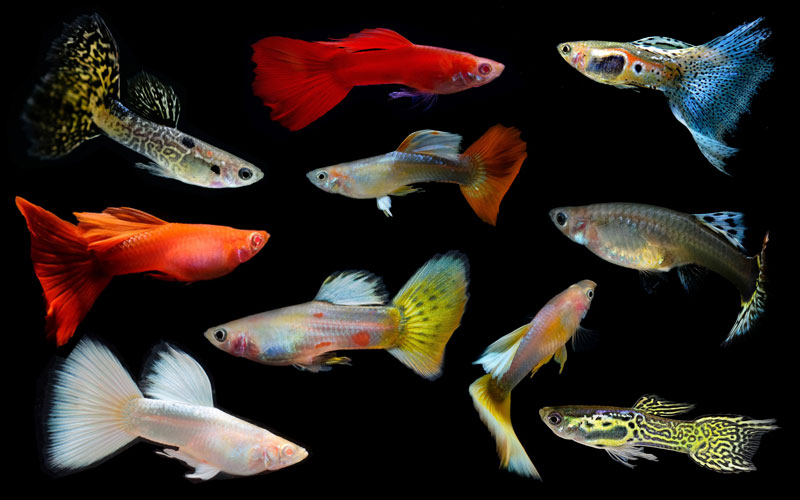
7. Boosting Fish Health and Immunity
7.1 Introducing Natural Food Sources
Guppy feeder fish offer a great way to introduce natural food sources to predatory fish. While commercial fish foods provide adequate nutrition, natural foods can enhance the overall health and vitality of fish. By incorporating guppy feeder fish into the diet, you are providing a more varied and diverse food source, which can help improve immune function, enhance digestion, and promote overall fish health.
7.2 Enhancing Pigmentation
Certain species of guppy feeder fish, such as those with vibrant colors, can enhance the pigmentation of other fish in the aquarium. This phenomenon is often observed in guppies, which have been selectively bred for their striking colors. By including these feeder fish in the aquarium, you can potentially enhance the pigmentation of other fish, creating a more visually appealing and vibrant aquatic display.
7.3 Disease Prevention
A healthy and well-fed fish is more resistant to diseases and infections. Guppy feeder fish provide essential nutrients and contribute to the overall well-being of predatory fish, boosting their immune systems and increasing their resilience against various diseases. Additionally, the natural behaviors exhibited by these feeder fish can help alleviate stress in the aquarium, minimizing the risk of diseases caused by stress-related factors.
8. Guppy Feeder Fish as a Source of Entertainment
8.1 Interactive Feeding
Watching your fish hunt and consume guppy feeder fish can be a highly engaging and entertaining experience. By allowing predatory fish to exhibit their natural hunting behaviors, you provide them with mental stimulation and enrichment. This interactive feeding approach adds excitement to the aquarium and allows you to witness the natural instincts of your fish.
8.2 Behavior Observation
Guppy feeder fish offer a unique opportunity to observe and study the behavior of fish in your aquarium. The presence of live or frozen feeder fish can elicit different reactions from predatory fish, allowing you to gain insights into their hunting strategies, territorial behavior, and social interactions. This firsthand observation can deepen your understanding of fish behavior and provide an enriching experience for fish enthusiasts.
8.3 Encouraging Breeding
The introduction of guppy feeder fish into the aquarium can also encourage natural breeding behaviors among fish species. The sight of live or active prey can trigger reproductive instincts in certain fish, leading to mating displays and courtship rituals. This can be particularly beneficial for fish breeders who are looking to foster a breeding environment. However, it is important to monitor the breeding processes closely to ensure appropriate population control.
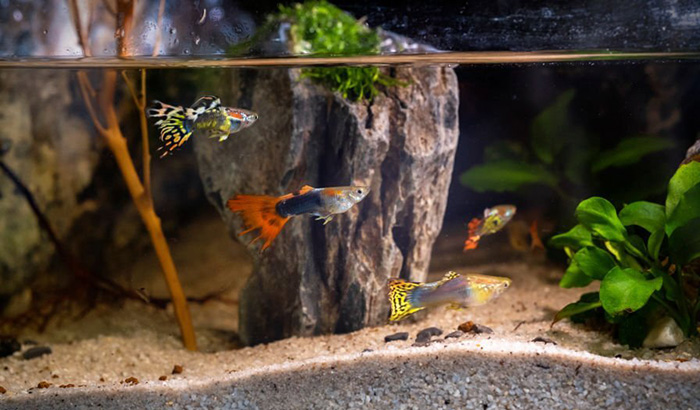
9. Choosing Guppy Feeder Fish for Different Aquatic Setups
9.1 Saltwater Aquariums
For saltwater aquariums, it is essential to choose guppy feeder fish species that can thrive in marine conditions and are compatible with other marine species. Some suitable feeder fish options for saltwater aquariums include chromis, wrasses, and damselfish. It is important to consider the specific requirements and compatibility of the feeder fish with other saltwater species before adding them to your aquarium.
9.2 Freshwater Aquariums
Freshwater aquariums offer a wider range of guppy feeder fish options. You can choose from various livebearer fish, such as guppies, mollies, and platies. These fish are not only suitable for providing nutrition to predatory fish but also add aesthetic appeal to the aquarium. Additionally, freshwater catfish and loaches can act as scavengers and assist in cleaning up organic waste.
9.3 Brackish Water Aquaria
Brackish water aquaria require careful consideration when choosing guppy feeder fish. Species that can tolerate the salinity levels of brackish water, such as certain mollies and archerfish, can be used as feeder fish options. It is important to maintain the appropriate salinity levels and ensure compatibility with other brackish water species to create a harmonious and healthy environment.
10. Potential Risks and Precautions with Guppy Feeder Fish
10.1 Introduction of Diseases
When introducing guppy feeder fish into your aquarium, there is a potential risk of introducing diseases or parasites. It is crucial to source feeder fish from reputable suppliers and quarantine them before adding them to the main tank to minimize the risk of contamination. Regular observation and monitoring of the overall health of the fish community is essential to detect and address any potential health issues promptly.
10.2 Overpopulation Issues
Feeder fish, particularly livebearers like guppies, have the potential to reproduce rapidly. Without proper population control measures, overpopulation can occur, leading to overcrowding and compromised water quality. To prevent overpopulation, consider implementing strategies such as separating male and female feeder fish or introducing natural predators of guppy feeder fish to maintain a balanced population.
10.3 Incompatibility with Other Fish Species
Not all fish species are compatible with guppy feeder fish. It is important to research and consider the specific requirements and behaviors of the fish species in your aquarium before introducing guppy feeder fish. Some fish may exhibit predatory behaviors towards the feeder fish, leading to stress or aggression. Careful selection and proper monitoring of fish compatibility are essential to ensure a harmonious and peaceful fish community.
In conclusion, guppy feeder fish offer numerous benefits to aquarium ecosystems. From their nutritional value and contribution to the cleanliness of the aquarium to their entertainment value and potential for boosting fish health and immunity, guppy feeder fish play a vital role in maintaining a healthy and thriving fish community. By understanding their different types, feeding habits, and compatibility with various aquatic setups, fish owners can fully harness the advantages of guppy feeder fish and create an optimal environment for their beloved aquatic pets.

